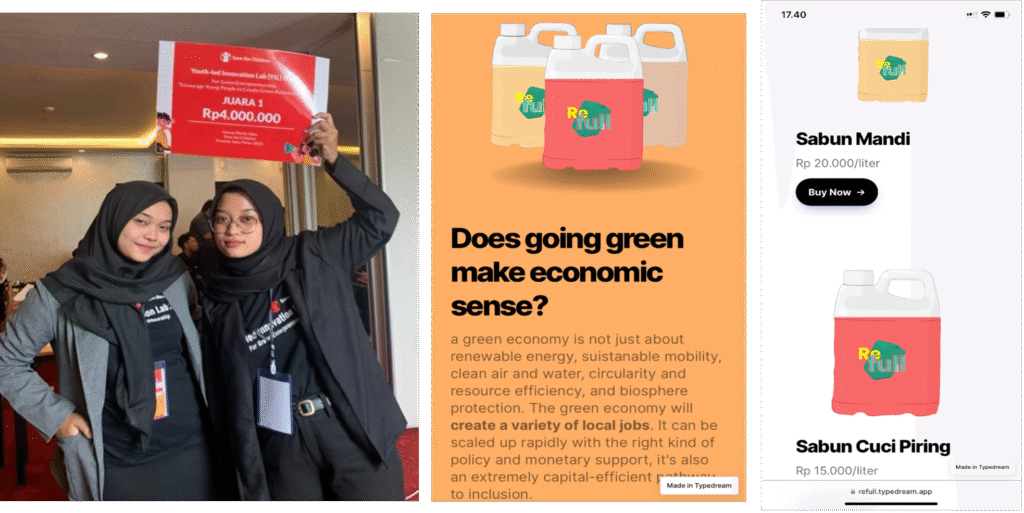
The Problem and Motivation Behind
“People in our community lack understanding on how to reduce, reuse, and recycle. We wanted to create something that not only provides a solution but also raises awareness.” — Sukma Jenny Emadina
Sukma Jenny Emadina and Gina Alpharetta, two 22-year-old young girls from Surabaya, Indonesia, noticed that their community, including university students and local residents, heavily relied on packaged products. They recognised that the lack of understanding around sustainable practices was one of the core reasons behind the plastic waste issue.
Indonesia is the second-largest contributor to plastic waste globally, and Surabaya, like many cities, faces a growing waste problem. Domestic waste—especially single-use plastics—continues to pile up, despite the harmful effects on the environment. In Surabaya, there is a lack of awareness about sustainable consumption, particularly when it comes to reducing, reusing, and refilling rather than just throwing things away.
Motivated by their commitment to environmental change, Sukma and Gina decided to create a simple, accessible solution that would encourage people to rethink their daily habits.
The Innovative Solution
“Many businesses talk about recycling, but we prioritise reducing waste from the start. Our goal is to build a habit of sustainability … our platform isn’t just about selling products; it’s about making people rethink their daily habits and how they impact the environment.” — Sukma Jenny Emadina
Refull is a digital-based refill business that promotes sustainable living by offering refillable household products such as dish soap, laundry detergent, and hand sanitiser. The concept is simple: instead of buying new plastic bottles every time, customers bring their own containers and refill them. This model significantly reduces plastic waste and encourages more sustainable habits. Unlike conventional recycling approaches, Sukma and Gina prioritised reducing waste from the outset.
Through the Youth Innovation Lab, Sukma and Gina gained essential skills in business development, design thinking, and digital marketing. The lab’s training enabled them to understand consumer behaviour, develop effective problem-solving strategies, and leverage social media to expand their reach. “The training gave us the confidence and skills to build Refull. It helped us see the bigger picture and how to create real change.” — Sukma explains.
Since its launch in 2022, Refull has made over 150 transactions through their platform. Refull has helped reduce the community’s single-use plastic consumption while promoting behavioural changes among university students and households. Additionally, Refull’s collaboration with local small businesses has helped boost the community’s economy by increasing demand for refillable products.
Lessons Learned from Addressing Challenges
- Time Management and balancing pursuing academic studies and doing business: Balancing university studies with running the business was initially a major challenge. To overcome this, Sukma and Gina created a structured schedule to manage both their academic and business responsibilities efficiently.
- Building awareness to overcome people’s reluctance to change their shopping habits : Convincing people to change their shopping habits was not easy. The team tackled this challenge through social media campaigns, local events, and peer-to-peer engagement, which gradually built a customer base and fostered a community of conscious consumers. “At first, people were sceptical, but we kept explaining the benefits. Now, they love the idea!” — Sukma adds.
- Competing with Big Brands: Since large corporations dominate the household product market, Refull initially struggled to compete. To differentiate themselves, Sukma and Gina focused on the unique value of sustainability and emphasised the importance of local community support.
Next Steps and Future Aspirations
“We want to make refilling a normal part of daily life, not just a trend. Sustainability should be easy and accessible for everyone.” — Sukma Jenny Emadina
Looking ahead, Sukma and Gina plan to grow Refull beyond Surabaya. They aspire to normalise refilling as a daily practice rather than a temporary trend. Their plan for the next steps includes:
- Developing a mobile app – Making ordering and refilling even easier.
- Launching awareness campaigns – Educating more people about reducing waste.
- Expanding their supplier network – Partnering with more local businesses to increase variety of refillable products.